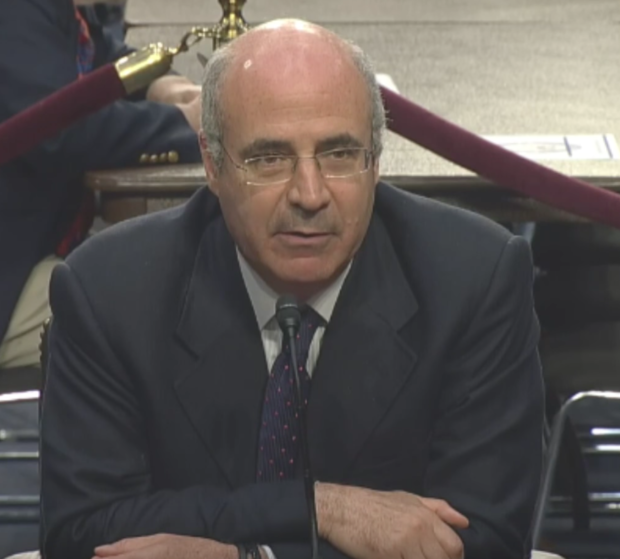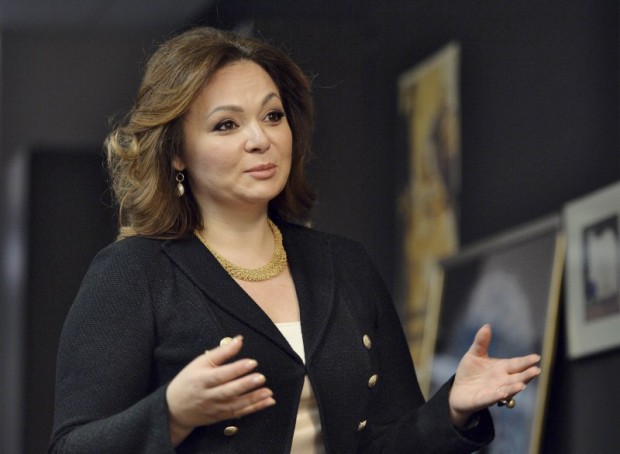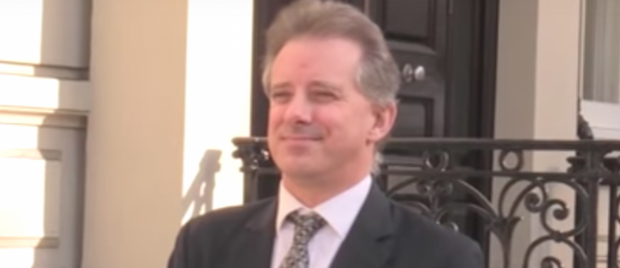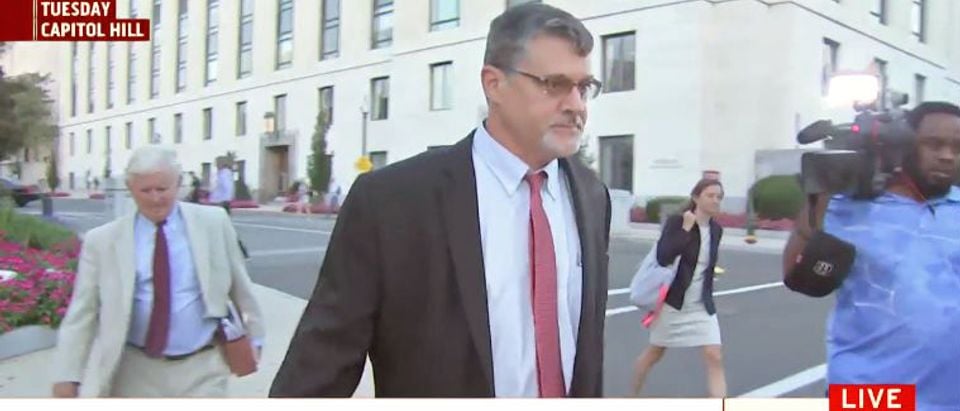The founder of the opposition research firm behind the Trump dossier told Congress this week that he regretted that the fruits of his investigation of a critic of the Kremlin were provided to and used by a top Russian government official.
A source familiar with Glenn Simpson’s testimony told The Daily Caller that the Fusion GPS partner also told the House Permanent Select Committee on Intelligence (HPSCI) that he knew that Christopher Steele, the British spy who wrote the dossier, had provided briefings to the FBI during the campaign.
Simpson, who testified behind closed doors for nearly seven hours on Tuesday, denied knowing that research he did as part of a pro-Kremlin lobbying campaign ended up in the hands of Yuri Chaika, Russia’s prosecutor general.
While Fusion GPS was being paid by the Clinton campaign and DNC for the Trump investigation, the firm was also working for BakerHostetler, a law firm that was representing Prevezon Holdings, a Russian energy company that faced stiff penalties from the Magnitsky Act. (RELATED: Oppo Researcher Behind The Trump Dossier Worked On Pro-Kremlin Lobbying Effort)
Fusion’s task was to investigate Bill Browder, a London-based banker who is almost single-handedly responsible for pushing through the Magnitsky Act, a 2012 law that sanctions Russian criminals.
The law, which is strongly opposed by the Russian government, is named for Sergey Magnitsky, Browder’s former lawyer who was killed in a Russian jail in 2009 while investigating a massive Russian money laundering scheme.

Bill Browder testifies before the Senate Judiciary Committee, July 27, 2017. (Youtube screen grab)
Simpson worked closely on the Browder project with Natalia Veselnitskaya, a Russian lawyer who represents Prevezon and who also attended the infamous June 9, 2016 meeting with Donald Trump Jr. at Trump Tower.
Simpson gave his Browder research to Veselnitskaya, who in turn took it to the Trump Tower meeting in the form of a four-page memo.
Veselnitskaya also recently acknowledged to NBC News that in Oct. 2015, she took research that Simpson compiled on Browder to Chaika, a close ally of Vladimir Putin’s.
Veselnitskaya also said that she consulted for Chaika, whose position is the equivalent of the U.S. attorney general. In May 2016, Chaika called on the U.S. government to help Russia in its efforts to detain Browder.
Browder has vehemently denied the allegations laid out against him by Fusion GPS, Veselnitskaya, and Chaika. He says that the troika have attempted to smear him in order to undercut the Magnitsky Act.
He’s gone as far as alleging that Simpson has aided and abetted the Russian government in its attempt to imprison him — a fate that Browder believes would end in his death.
“If it is true that Glenn Simpson was supplying information about me to the Russian government, it’s far more serious than smear campaigning or Foreign Agents Registration Act violations,” Browder told TheDC last week, after it was revealed that Simpson’s research ended up on Chaika’s desk.

Russian lawyer Natalia Veselnitskaya speaks during an interview in Moscow, Russia November 8, 2016. Picture taken November 8, 2016. (REUTERS/Yury Martyanov)
“It would mean that Simpson was assisting the Putin regime in their plot to get me back to Russia to have me imprisoned and killed.”
Simpson was asked in Tuesday’s House interview whether he was aware that Veselnitskaya had shared his research with either Trump Jr. or Chaika.
TheDC is told that Simpson, a former Wall Street Journal reporter, denied knowing about Veselnitskaya’s actions.
Simpson also said that he regretted that his research on Browder may have ended up in the hands of the Kremlin, the source familiar with Simpson’s testimony told TheDC. Simpson claimed that he initially believed that he would only be researching an obscure tax evasion case and that he took the case as a “favor” to BakerHostetler because he had worked with the firm in the past and liked them. (RELATED: Bill Browder: Fusion GPS Assisted Kremlin In Effort ‘To Have Me Imprisoned And Killed’)
An email seeking comment from Simpson and his attorney, Josh Levy, was not returned by press time.
Simpson’s work with Veselnitskaya has been the subject of intense interest ever since details of the Trump Tower meeting were reported by The New York Times in July.
Trump critics have said that the meeting showed that the Trump team attempted to collude with Russian operatives. Trump supporters have said that Simpson and Veselnitskaya’s involvement raises the possibility that the meeting was a setup, or that disinformation from the meeting was shared with Steele, the author of the dossier.
Two more neutral theories are that Veselnitskaya attended the meeting because of her passionate stance against the Magnitsky Act or that the Russian government coordinated the meeting in order to test whether the Trump campaign could be compromised and infiltrated.
Special Counsel Robert Mueller is taking a close look at the meeting and has reportedly interviewed some of its attendees, including Rinat Akhmetshin, a Russian-American lobbyist and former Soviet military intelligence officer who worked closely with Veselnitskaya and Simpson.
Trump Jr. accepted that meeting after an acquaintance named Rob Goldstone emailed him saying that a “Russian government attorney” and the Russian prosecutor general wanted to provide the Trump campaign with dirt on Hillary Clinton.
“If it is what you say I love it,” Trump Jr. replied to Goldstone, a music publicist who represents a Russian-Azerbaijani pop musician whose family has ties to the Trumps.
Both Veselnitskaya and Trump Jr. say that nothing came from the meeting and that it was a waste of time. They claim that Veselnitskaya talked mostly about the Magnitsky Act, which Trump Jr. says was of less interest to him than Clinton information.
The four-page memo that she took to the meeting contained one passing mention of Clinton. It alleged that a business affiliate of Browder’s may have made illegal donations to Clinton’s campaign.
It is unclear if Simpson added that piece of research to the memo. The rest of the memo alleges that Browder laundered money and evaded Russian taxes while at Hermitage Capital, a hedge fund that was once Russia’s largest foreign investor.
In his HPSCI interview, Simpson denied knowing anything about the Trump Tower meeting, or that his research was being shared in that session or several months earlier with Chaika.
Simpson told House investigators that he was surprised when he read in the newspaper that Veselnitskaya had attended the meeting. Conservatives have voiced skepticism over that claim, largely because of a report from Fox News last week that Simpson was with Veselnitskaya on the morning of the Trump Tower meeting as well as the day after.
***
Simpson’s admission that he knew that Steele met with the FBI could also be significant, as it shows that a contractor for the Clinton campaign and DNC provided information that could have led to a federal investigation of the their political opponent, Donald Trump.

Chris Steele during an interview with CBSN. (YouTube screenshot/ CBS News)
Details of Steele’s outreach to the FBI — which began in July 2016 — have been spotty. Though a source familiar with Simpson’s testimony said that the oppo research acknowledged that he was aware of Steele’s briefings to the feds, it still remains unclear whether Simpson directed Steele to provide the briefings and whether the Clinton campaign and DNC were aware of the briefings.
Steele first met with an FBI official in Rome in early July 2016, just weeks after he wrote his first memo for the dossier. Several weeks later, the FBI opened its counterintelligence investigation into possible collusion between the Trump campaign and Russian operatives.
The FBI is said to have relied heavily on the dossier in the initial stages of its investigation. The document was also reportedly cited in an application for a Foreign Intelligence Surveillance Act warrant against Trump campaign adviser Carter Page.
Page is accused in the dossier of meeting secretly with Kremlin officials during the campaign and serving as the collusion conduit with Russian leaders. Page vehemently denies the allegations.
Steele met with FBI agents again in September. The two sides reportedly struck an informal agreement in which Steele would be paid to continue gathering information on Trump. The deal fell apart and Steele was never paid for his work. CNN has reported that the FBI did compensate Steele for some expenses.
Steele, acting on the direction of Simpson, provided off-the-record briefings to reporters beginning in Sept. 2016. He met with journalists from The New York Times, The Washington Post, CNN, The New Yorker, Yahoo! News and Mother Jones.
Yahoo! published an article based on Steele’s allegations on Sept. 23, 2016. The piece, by veteran reporter Michael Isikoff, said that federal officials were investigating the Trump campaign and Page’s alleged contacts with Russians. The article did not disclose Steele’s, Fusion’s or the Clinton campaign’s involvement in the investigation or the dossier’s existence.


